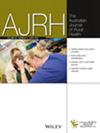The Kimberley region of Western Australia (WA) is classified by the Modified Monash Model as MM6 & 7 (‘Remote/Very Remote’). Many physiotherapists in the Kimberley are considered ‘rural generalists’ and require a diverse set of clinical and non-clinical skills to work successfully within this setting.
To understand physiotherapists’ perspectives regarding job satisfaction within the Kimberley region a ‘rural and remote’ areas of Australia.
An exploratory case study approach examined physiotherapists' job satisfaction in the Kimberley. Each participant completed a demographic survey and a one-on-one face-to-face interview lasting for approximately 60 minutes. Transcriptions were analysed and presented thematically. Eleven physiotherapists (nine women, two men, median age = 32 [27–60] years) participated in the study. Participants' median time working in the Kimberley was 2 (1–15) years; eight participants completed a rural placement, and eight participants had a rural background.
Two overarching themes relating to job satisfaction emerged: ‘personal factors’ and ‘workplace factors’. Furthermore, several sub-themes illustrated high levels of job satisfaction. Positive sub-themes relating to personal factors included ‘belonging to the community and a rural lifestyle’. ‘Diversity in caseloads’ and ‘workplace culture’ were examples of positive workplace sub-themes. Subthemes that challenged the participants personally were ‘family arrangements’ including schooling, ‘spousal employment and family separation’ and the ‘transiency and social issues’ within these remote communities. Workplace challenges comprised of ‘barriers to providing best practice’ and the ‘workforce and clinical experience’ found within the Kimberley physiotherapy community and the wider health care workforce. The primary challenge of job satisfaction that encompassed both personal and workplace factors was ‘accommodation’, with ‘cost’, ‘lack of availability’, and ‘perceived unsafe location’ challenging physiotherapists’ decisions to remain in the Kimberley.
This study describes the many factors impacting job satisfaction among physiotherapists in a rural and remote location in WA Australia. These factors warrant consideration by organisations interested in improving recruitment and retention in this context. Improving recruitment and retention in physiotherapists in rural and remote Australia has the potential to positively influence health service provision, and therefore improve health outcomes for those living in rural and remote communities.


